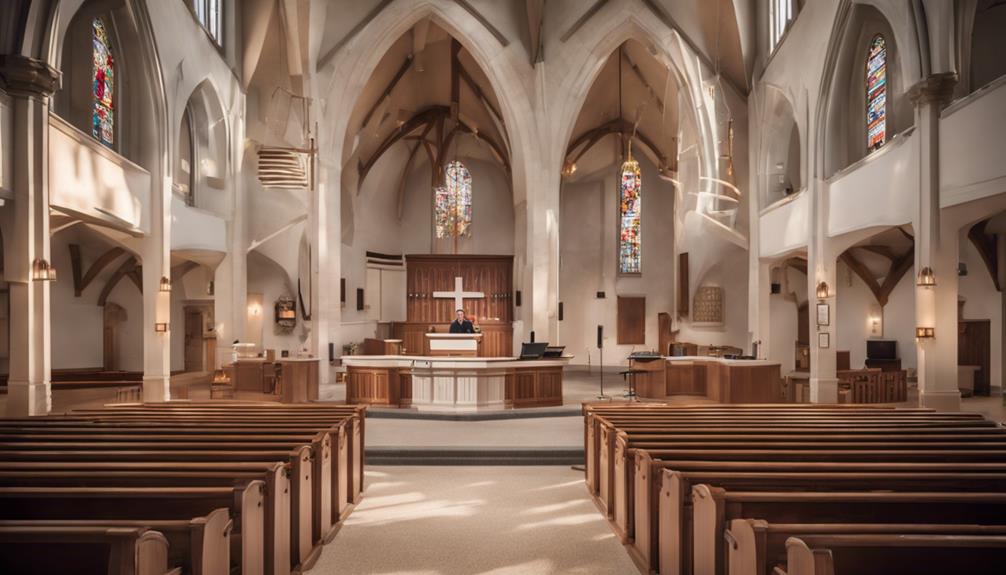In our church, we make it a priority to ensure every member of our congregation feels valued and included. The introduction of Deaf-friendly services in our community has received a warm reception and heartfelt thanks from those we aim to serve.
From ASL interpreters during services to tailored youth programs, we are committed to fostering an environment where everyone can fully participate and engage.
Curious to learn more about the specific initiatives we have in place to cater to the Deaf community?
Key Takeaways
- Sign Language Interpretation Services with consistent availability and ongoing training
- Accessibility Measures like Closed Captioning and Hearing Loop System
- Deaf Ministry Programs offering Sign Language Classes and Interpreter Availability
- Community Engagement through Outreach Events, Workshops, Youth Programs, and Volunteer Opportunities
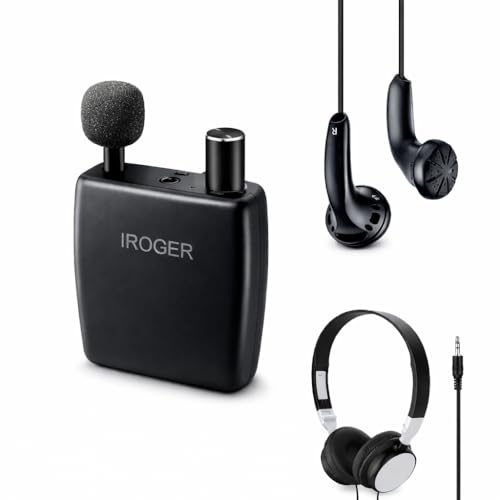
IROGER Hearing Amplifier for Seniors, Personal Sound Amplifier, Smart Auto-Gain, Directional Microphone, Rechargeable with 120-Hour Battery, Headphones & Earbuds Included
Smart Auto-Gain Control – Enjoy crystal-clear sound at all times. iRoger automatically balances audio levels to enhance voices...
As an affiliate, we earn on qualifying purchases.
Importance of Deaf-Friendly Services
In our church community, recognizing the importance of Deaf-friendly services is fundamental to fostering inclusivity and accessibility for all members, including Deaf and hard of hearing individuals. Embracing the needs of the Deaf community through initiatives like sign language interpretation and tailored resources is at the core of our Deaf ministry. By offering services that cater to diverse communication styles, such as visual aids and written scripts, we aim to enhance the worship experience for everyone, ensuring equal participation and understanding.
Creating a Deaf-friendly environment goes beyond just providing basic accommodations; it signifies a deeper commitment to diversity, empathy, and embracing the unique perspectives that each member brings. Through live interpretation services and the utilization of hearing augmentation technologies, we bridge communication gaps and cultivate a space where all individuals feel valued, included, and heard. Ultimately, our dedication to Deaf-friendly services not only fosters a sense of community but also promotes spiritual fulfillment and belonging for Deaf individuals within our congregation.

Joanbro Personal Sound Amplifier for Seniors, Voice Enhancement Devices, Pocket Sound Amplifiers for Elderly People, Adults, 50dB Gain, with Headphones & Earbud, 3 Types Mics, 3 Tone, Volume Control
SUPERIOR PERSONAL SOUND AMPLIFIER: Applying noise cancelling, automatic gain control and advanced amplifying circuit, this sound amplifier device...
As an affiliate, we earn on qualifying purchases.
Sign Language Interpretation Services
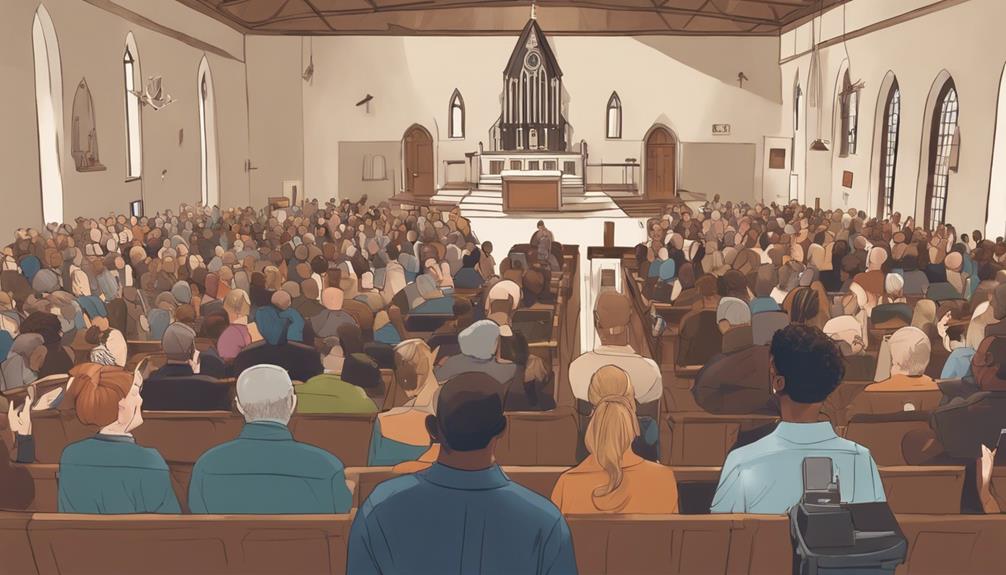
We believe that ensuring a consistent interpreter availability schedule, offering ongoing training for interpreters, and seeking feedback from the Deaf congregation are vital steps in enhancing sign language interpretation services at our church. These points contribute to the effectiveness and quality of interpretation, creating a more welcoming and inclusive environment for all individuals.
Interpreter Availability Schedule
Ensuring consistent accessibility, our church maintains a set schedule for ASL interpreters to be present during Sunday services and key events. This schedule allows our Deaf community members to participate fully in our services and activities.
By providing advance notice of interpreter availability, we empower Deaf and hard of hearing individuals to engage in church events with ease and confidence. Our commitment to inclusion is evident in the proactive communication of interpreter schedules through church announcements, bulletins, and online platforms.
We recognize the importance of reliable interpreter services in creating a welcoming environment for all. This structured approach not only demonstrates our dedication to accessibility but also fosters a sense of belonging and community among individuals with varying hearing abilities.
Training for Interpreters
Our church values the importance of comprehensive training for interpreters in sign language interpretation services, encompassing ASL grammar, vocabulary, and cultural sensitivity. Deaf people rely on skilled interpreters for accurate and effective communication during services. Training programs include certification courses and continuous professional development to ensure interpreters stay updated on best practices. Workshops, seminars, and resources are provided to support interpreter training. Below is an overview of the key components covered in interpreter training:
| Training Components | Description | Importance |
|---|---|---|
| ASL Grammar | Understanding the structure and rules of ASL | Crucial for fluency |
| Vocabulary | Learning signs and expressions in ASL | Enhances communication |
| Cultural Sensitivity | Awareness of Deaf culture and norms | Promotes inclusive environment |
Feedback From Deaf Congregation
Recognizing the profound impact of sign language interpretation services on the spiritual experience of our Deaf congregation, we've gathered valuable feedback to enhance the inclusivity and accessibility of our worship services.
Deaf congregation members express immense gratitude for the presence of ASL interpreters during our church services, emphasizing how these services significantly enhance their participation and connection with the spiritual content. The feedback from our Deaf community highlights the positive influence of sign language interpretation on their overall spiritual experience, underlining the importance of offering such services to ensure everyone can engage fully in our worship gatherings.
ASL interpreters are instrumental in fostering clear communication and understanding, playing a pivotal role in creating a welcoming and inclusive environment for all worshippers.

Joanbro Hearing-Amplifiers for Seniors, Sound-Amplifier with Adjustable Volume & Tone Control, Handheld Pocket Size Hearing Assisted Devices with Replaceable Microphone, Headphones, Earbuds, Batteries
Clearer Hearing Anytime, Anywhere: Boosts voice up to 50dB- perfect for TV watching, daily conversations, or outdoor activities....
As an affiliate, we earn on qualifying purchases.
Closed Captioning for Sermons
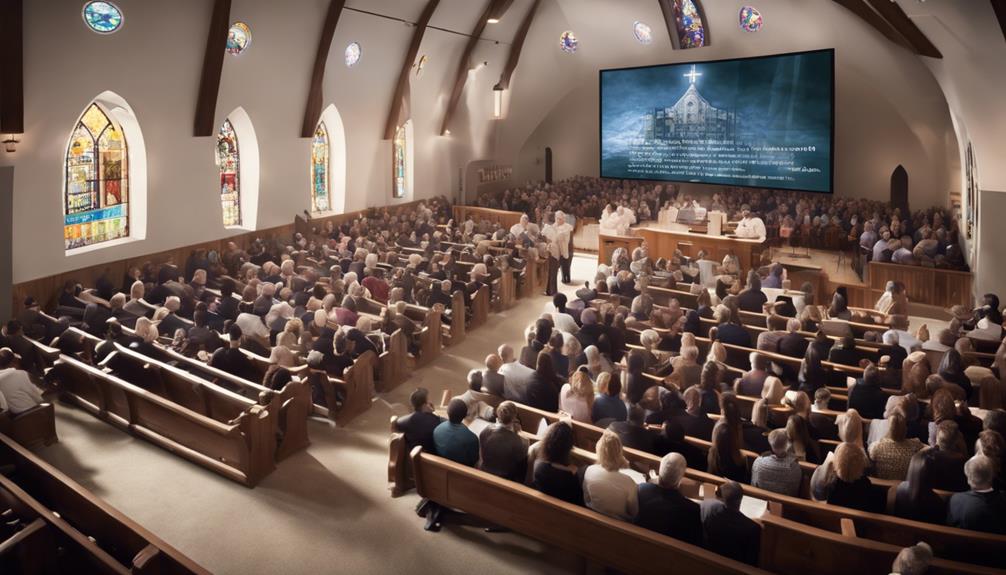
Closed captioning for sermons is a vital accessibility feature that enriches the worship experience for Deaf and hard of hearing individuals. It allows everyone to follow along with the sermon content in real-time, enhancing the inclusivity of church services. By projecting captions onto screens, congregants who rely on this service can fully participate and engage with the message being shared. Churches that offer closed captioning show a commitment to accommodating diverse communication needs within their community. This innovative approach not only benefits those with hearing impairments but also improves understanding and engagement for all members of the congregation.
| Benefits of Closed Captioning for Sermons | |||
|---|---|---|---|
| Enhances inclusivity | Allows real-time following of sermon content | Improves engagement and understanding | Demonstrates commitment to accessibility |

Neosonic Rechargeable Hearing Amplifier to Aid TV Watching and Conversation, Wireless Neckband Headphones for Seniors & Adults, Remote Microphone Noise Cancelling - NW10 Pro
BACKGROUND NOISE REDUCTION - Equipped with a wireless external microphone, the NW10 Pro allows you to place the...
As an affiliate, we earn on qualifying purchases.
Assistive Listening Devices Available
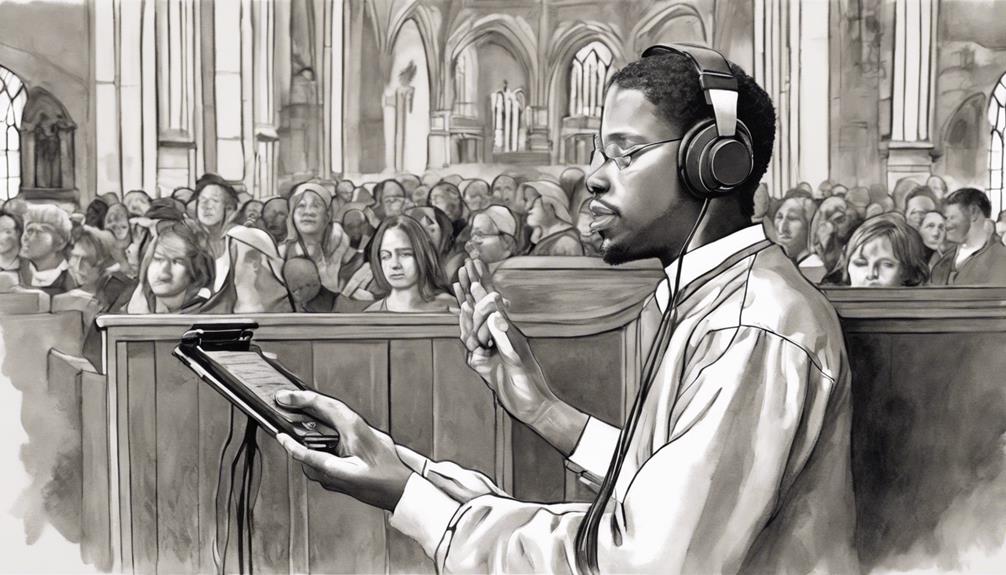
Upon entering our church, visitors will find a range of Assistive Listening Devices available to enhance their worship experience, catering to individuals with hearing impairments. These devices, endorsed by the Association of the Deaf, are an essential part of our commitment to inclusivity and accessibility.
Here are three key features of our Assistive Listening Devices:
- Cutting-Edge Technology: Our ALDs are equipped with top-of-the-line microphones and transmitters that seamlessly integrate with our sound system, ensuring that every word spoken during the service is crystal clear for individuals with hearing impairments.
- Borrowing Options: We offer these devices for borrowing during services, allowing hard of hearing individuals to actively participate in the worship experience without missing a beat. This service is provided at no additional cost to ensure everyone can engage fully.
- Maintenance and Hygiene: The initial cost of our ALDs covers hardware and maintenance, guaranteeing ongoing accessibility for our congregation. Additionally, we prioritize hygiene by cleaning the devices after each use to maintain optimal performance and comfort for all users.
Deaf Ministry Programs
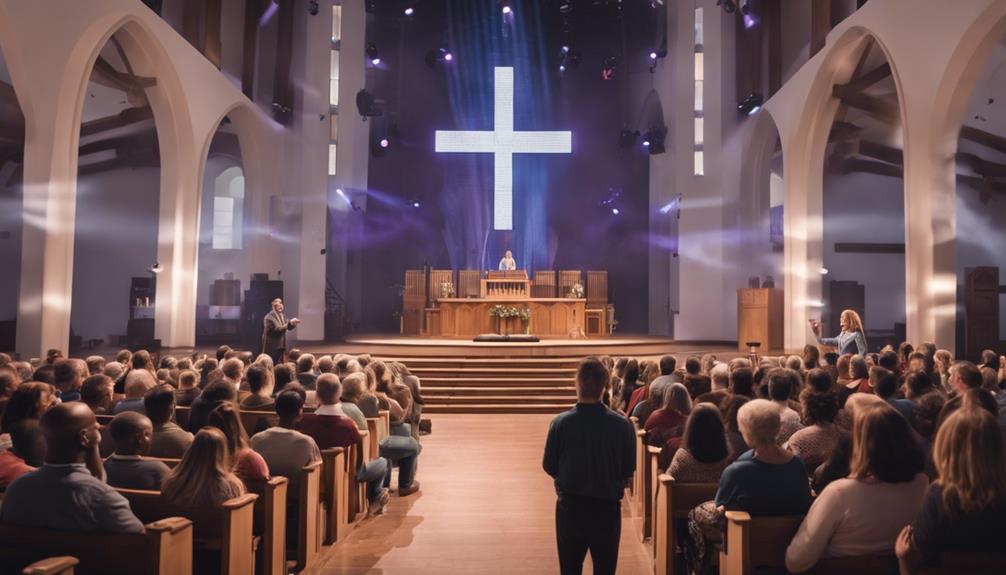
We pride ourselves on offering a range of Deaf ministry programs that cater to the needs of our community.
From sign language classes to regular interpreter availability, we ensure that our services are accessible and inclusive.
Our commitment to providing Deaf-friendly worship services and social events reflects our dedication to fostering a welcoming environment for all.
Sign Language Classes
Participants in our church's Deaf Ministry programs engage in structured sign language classes to enhance their communication skills with the Deaf community.
- Our sign language classes cover basic to advanced skills for effective communication.
- Experienced instructors provide personalized attention and feedback.
- Participants have reported improved communication within and outside the church community.
These classes are designed to promote inclusivity and understanding among our congregation members. By offering these classes, we aim to create a welcoming environment where everyone can communicate effectively and engage meaningfully with one another. Join us in learning the language of inclusion and connection through our sign language classes in the Deaf Ministry programs.
Interpreter Availability
Ensuring consistent availability of skilled interpreters is paramount for fostering a Deaf-friendly environment and promoting inclusive worship experiences in our church's Deaf Ministry Programs. In the United States, Deaf Ministry Programs prioritize providing qualified ASL interpreters during services to facilitate full participation for Deaf individuals.
Whether through dedicated volunteers or paid professionals, interpreter availability is essential for creating an inclusive space where everyone can engage in worship. To support the valuable service of interpreters, considerations are made for offering honorariums.
Maintaining a standard of quality in ASL interpretation underscores the significance of reliable and continuous interpreter availability. By prioritizing this aspect, we aim to enhance the accessibility and richness of our Deaf Ministry Programs.
Deaf-Friendly Worship Music
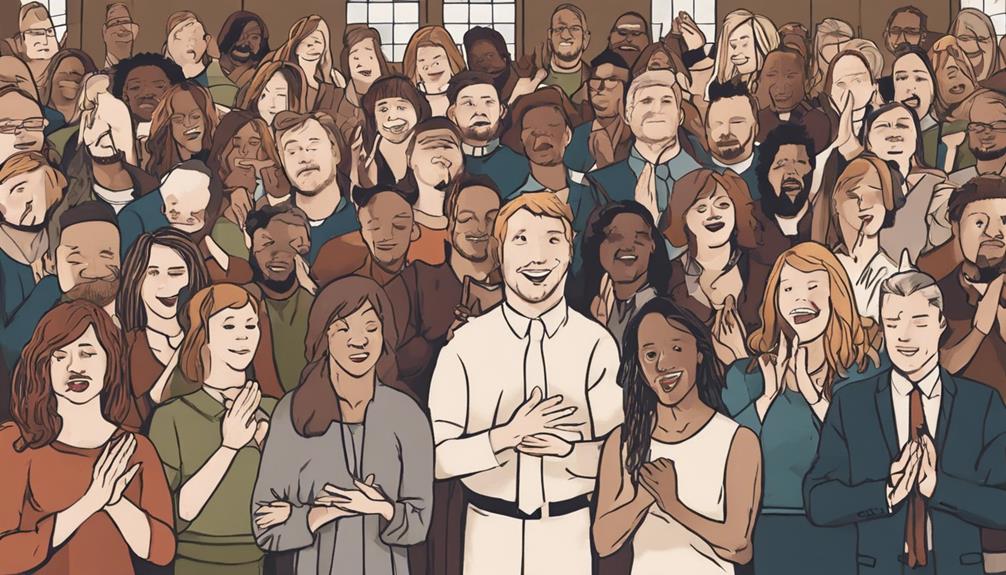
Incorporating Deaf-friendly worship music enhances the inclusivity and richness of the worship experience for all members of the congregation. When considering how to make worship music more accessible to Deaf and hard of hearing people, churches can offer a brief guide on creating a welcoming environment through music. Here are three key elements to consider:
- Use of Sign Language and ASL Poetry: Incorporating sign language and ASL poetry into worship music can add depth and meaning to the songs being performed. This visual representation allows Deaf individuals to engage more fully with the music and feel included in the worship experience.
- Visual Arts Integration: Visual arts, such as projected lyrics, artwork, or videos that complement the music, can enhance the worship service for Deaf attendees. This multi-sensory approach creates a more immersive experience that caters to both auditory and visual senses.
- ASL Choir Performances: Having a choir that signs hymns or songs in ASL can be a powerful way to involve Deaf members in the music ministry. It not only showcases the beauty of sign language but also fosters a sense of community and unity among all worshippers.
Deaf Community Outreach Events
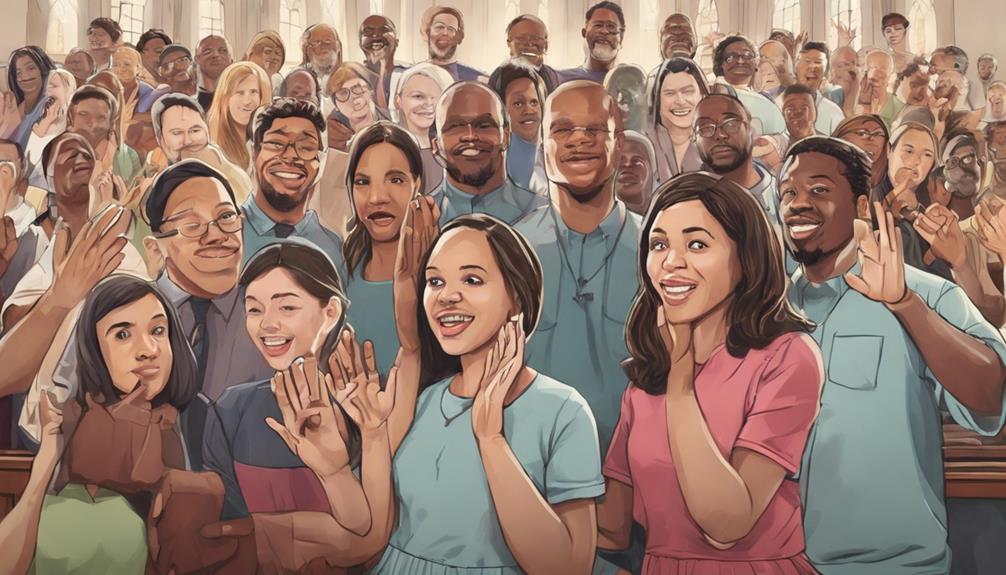
To further embrace and support the Deaf community, our church actively organizes engaging outreach events that aim to foster a deeper connection and understanding among all members of our congregation. These events provide hard opportunities for Deaf individuals to actively engage with the church, fostering inclusivity and support.
We host a variety of activities, including sign language workshops, Deaf culture awareness sessions, and social gatherings that cater to the unique needs and interests of the Deaf community. Through these outreach events, we showcase our dedication to serving and connecting with the Deaf population, creating a welcoming environment where everyone feels valued and respected.
Deaf Awareness Workshops
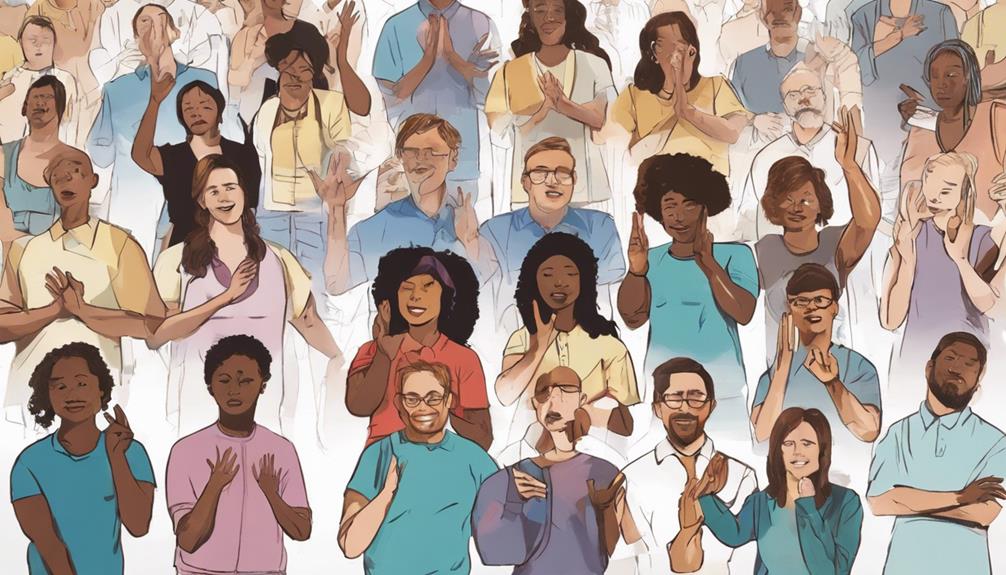
Deaf Awareness Workshops offer valuable insights into Deaf culture, communication methods, and inclusion strategies to enrich our church community's understanding and support for individuals who are Deaf or hard of hearing.
- Sign Language Basics: Participants in these workshops can learn fundamental sign language skills to better communicate with Deaf individuals, fostering a more inclusive environment.
- Deaf History: Understanding the rich history of the Deaf community helps dispel misconceptions and promotes respect for diverse cultural backgrounds.
- Promoting Accessibility: Workshops provide practical guidance on making church services and events more accessible, such as by incorporating captioning services or ensuring proper lighting for lip-reading.
ASL Classes for Members

At our church, we're excited to offer American Sign Language (ASL) classes for members looking to enhance their communication skills.
These classes provide a valuable opportunity for us to improve interactions with Deaf and hard of hearing individuals in our community.
We believe that participating in structured ASL lessons can help create a more inclusive and understanding environment within our congregation.
ASL Class Schedule
Every Sunday morning before service, our church offers ASL classes for members facilitated by a certified instructor experienced in Deaf culture. These classes provide a valuable opportunity for our community to learn and engage with American Sign Language.
Here's what you can expect from our ASL class schedule:
- Structured Learning: Members can participate in structured lessons covering basic ASL vocabulary.
- Grammar Instruction: Our classes also focus on teaching the grammar rules of ASL to enhance communication skills.
- Conversational Practice: Participants engage in conversational practice to apply their knowledge in real-life scenarios.
Join us to not only learn ASL but also to foster a more inclusive and connected community.
Instructor Qualifications
Led by a certified ASL instructor with over 15 years of experience, our church's ASL classes for members prioritize high-quality instruction and inclusivity.
Sarita Fowler, our dedicated instructor, not only holds a ThM degree but is also nationally certified in ASL and Spanish. With her background as a Spanish professor, Sarita brings a unique perspective to our classes, enriching the learning experience for our members. Her qualifications ensure that members receive top-notch instruction and support as they delve into the world of American Sign Language.
Member Participation Opportunities
With our ASL classes for members, we aim to empower individuals to engage fully within our church community by fostering effective communication with Deaf individuals.
- Members learn basic ASL skills to interact with Deaf and hard of hearing individuals during church activities and services.
- These classes enhance member participation, promoting unity and understanding among our church family.
- Participation in ASL classes signifies a dedication to inclusivity and accessibility within our community.
Deaf-Friendly Communication Resources
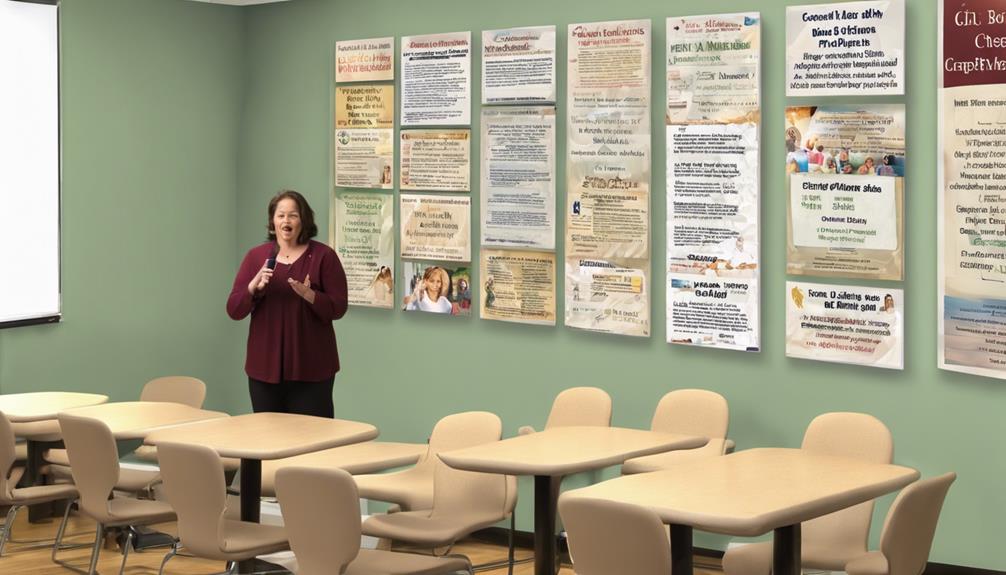
Utilizing a variety of communication resources in church settings is crucial for effective communication with the Deaf community. Written communication methods, such as pre-written scripts and manuscripts, play a vital role in providing accessibility. Live interpretation services with ASL interpreters on stage help bridge the communication gap and make services inclusive.
Hearing augmentation technologies, like Assistive Listening Devices (ALDs), cater to hard of hearing individuals, ensuring active engagement during services. Innovative solutions, such as spf.io, offer live captioning, enhancing church accessibility initiatives further. Deaf-friendly worship practices go beyond basic communication, incorporating sign language, visual elements, and providing accessible resources to create an inclusive environment where everyone can participate fully.
Accessibility Accommodations in Church Facilities
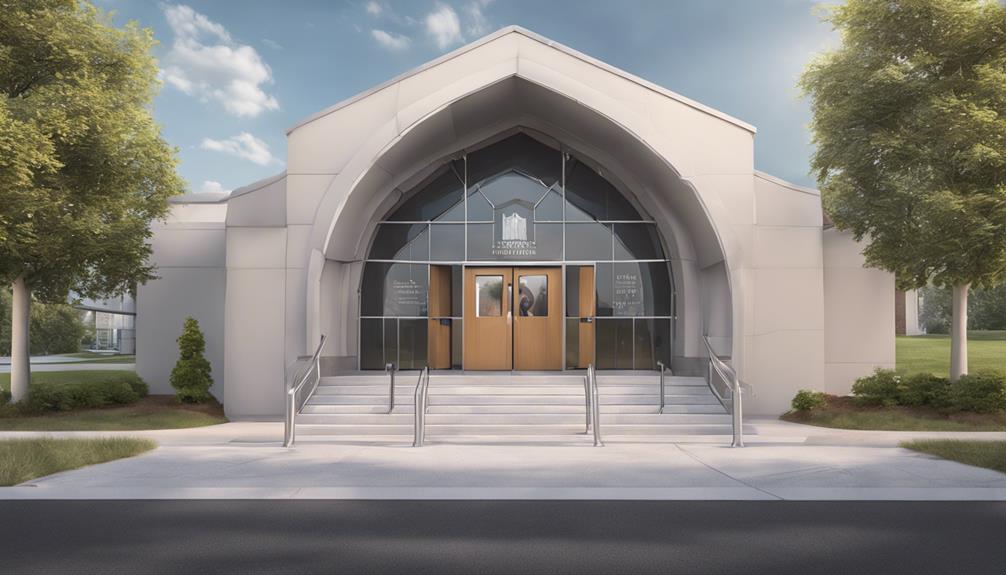
At our church, we prioritize accessibility for all individuals, including those with hearing impairments.
We offer services like sign language interpreters and a hearing loop system to ensure everyone can fully participate in worship and gatherings.
These accommodations aim to create an inclusive and welcoming environment for all members of our community.
Sign Language Interpreters
Our church ensures accessibility for Deaf and hard of hearing individuals through the provision of skilled sign language interpreters positioned strategically during key elements of our services. This commitment to inclusivity allows all members of our congregation to engage fully in the worship experience. The use of sign language interpreters not only promotes understanding but also fosters a sense of community where everyone feels valued and welcomed. By having interpreters for crucial components such as sermons, prayers, and worship songs, we ensure that no one is left out during our gatherings. We prioritize the presence of well-trained interpreters to guarantee that Deaf attendees can participate effortlessly.
- Skilled interpreters are strategically positioned for clear communication.
- Interpreters facilitate understanding during important service elements.
- Inclusivity and community are fostered through sign language interpretation.
Hearing Loop System
Implementing a hearing loop system in our church facilities ensures seamless audio transmission directly to compatible hearing devices, enhancing the worship experience for individuals with hearing impairments. This technology helps reduce background noise, delivering improved sound quality to those with hearing loss. By offering compatibility with T-coil equipped hearing aids and cochlear implants, our church embraces inclusivity and accessibility for all worshippers. The commitment to installing hearing loop systems showcases a dedication to innovation in accommodating diverse needs within our community. Worshippers with hearing impairments can now participate fully in services, feeling connected and engaged. This technology not only meets accessibility standards but also fosters a sense of belonging and togetherness in our church family.
| Benefits of Hearing Loop System | ||
|---|---|---|
| Seamless audio transmission | Enhanced sound quality | Reduced background noise |
| Compatible with T-coil devices | Improved worship experience | Commitment to inclusivity |
Deaf-Friendly Youth Programs
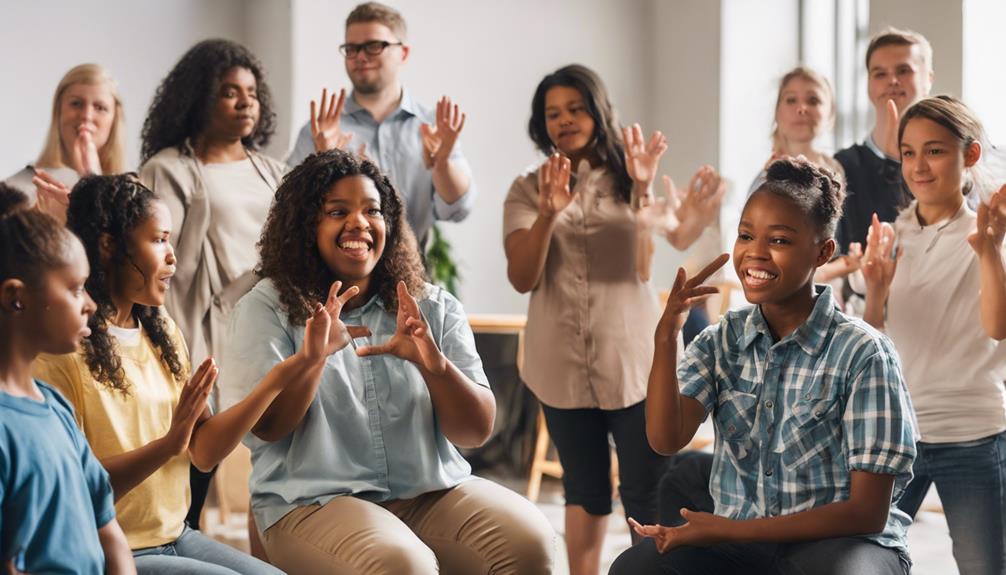
Ensuring that Deaf-friendly youth programs at churches cater to the unique needs of Deaf children and teenagers is paramount for fostering an inclusive and supportive environment.
- Incorporating Sign Language: Deaf-friendly youth programs often incorporate sign language into their activities, ensuring Deaf participants can fully engage and communicate.
- Visual Aids and Deaf Culture: These programs make use of visual aids and embrace Deaf culture to create an inclusive atmosphere that celebrates diversity.
- Interactive Bible Studies: Youth activities may include ASL lessons, Deaf-led worship, and interactive Bible studies conducted in sign language. These initiatives not only nurture spiritual growth but also promote a sense of belonging and community among Deaf youth.
Inclusive Bible Study Groups
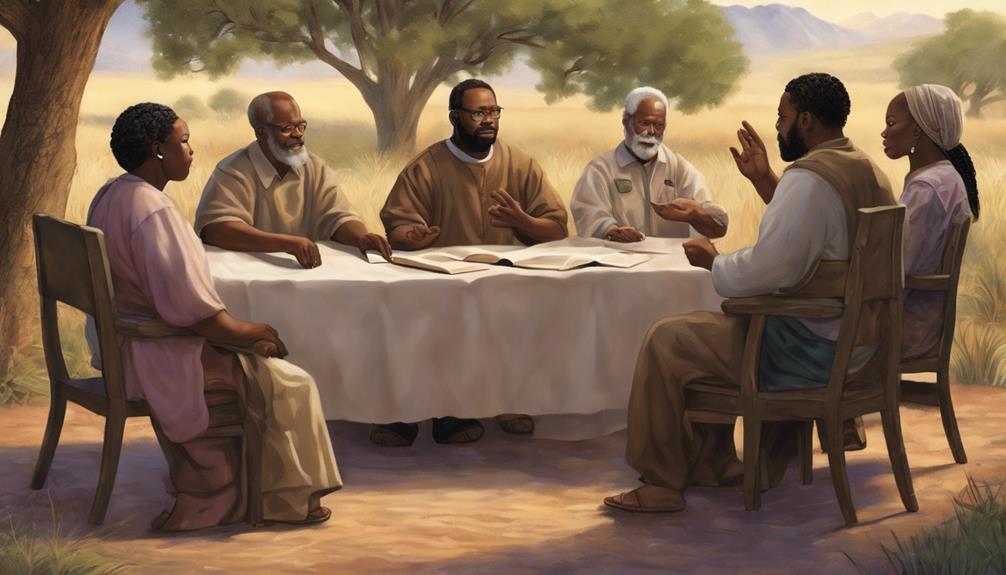
To further cultivate a welcoming and accessible church environment, inclusive Bible study groups are vital for accommodating the diverse communication needs of Deaf and hard of hearing individuals. These groups go beyond just providing a space for study; they offer accessible resources such as American Sign Language (ASL) interpretation and written materials, ensuring that all participants can fully engage in discussions and spiritual growth. By promoting inclusivity and understanding of diverse communication needs, these Deaf-friendly Bible study groups create a supportive environment where everyone can feel valued and included.
Participants in these inclusive groups have the opportunity to delve into meaningful discussions and deepen their spiritual understanding without communication barriers. This commitment to accessibility and inclusion in religious education not only enriches the experiences of Deaf and hard of hearing individuals but also fosters a sense of community within the church. Inclusive Bible study groups exemplify a dedication to ensuring that everyone can participate fully in the church's teachings and activities.
Deaf-Friendly Volunteer Opportunities
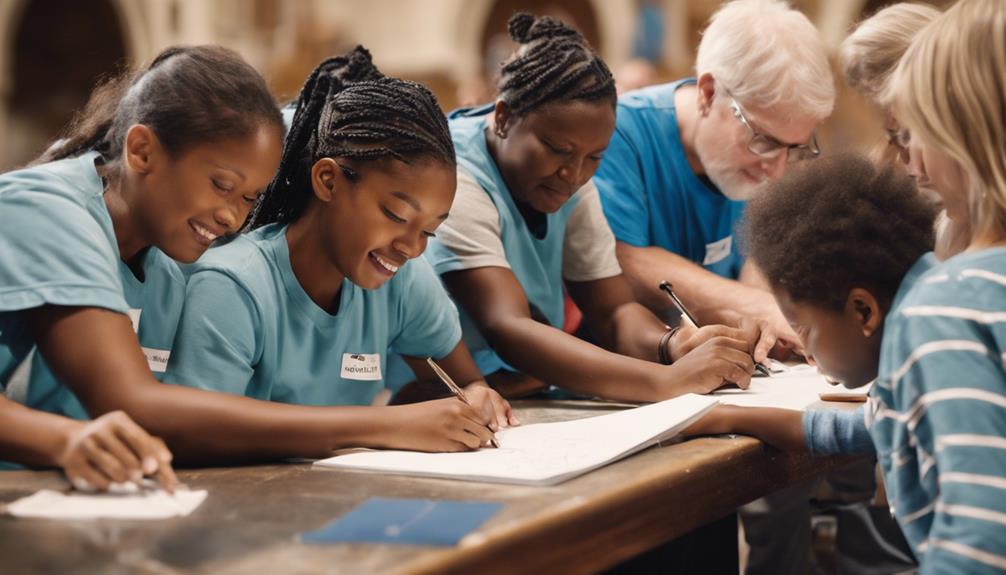
Volunteers play a crucial role in creating a welcoming and accessible church environment for Deaf and hard of hearing individuals through a variety of Deaf-friendly opportunities.
- ASL Interpretation: Offering ASL interpretation during services can greatly enhance the worship experience for Deaf individuals, ensuring they have full access to the message being shared.
- Technology Assistance: Volunteers can assist in implementing and maintaining technology-based solutions that enhance accessibility, such as hearing loops or captioning systems, making it easier for Deaf individuals to engage with church activities.
- Written Communication Support: Volunteers can help create and distribute written materials in accessible formats, such as providing bulletins in advance or offering digital copies of sermons, ensuring Deaf individuals can follow along and stay connected with the community.
Collaboration With Deaf Organizations
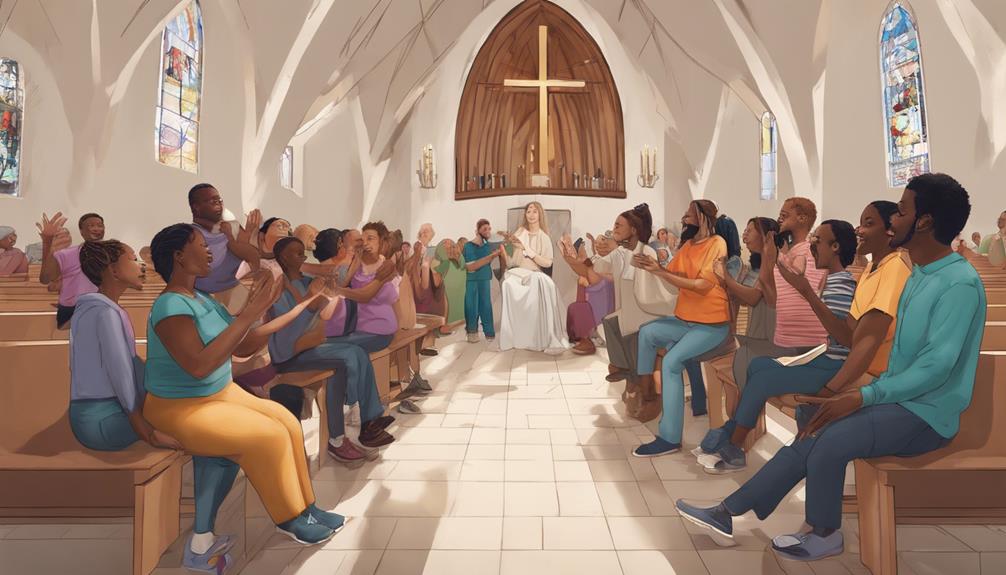
Collaborating with Deaf organizations enriches our church community by providing valuable resources and insights for creating deaf-friendly services. These partnerships offer a deep understanding of Deaf culture, communication methods, and accessibility needs, enhancing our ability to cater to the Deaf individuals in our congregation.
By working closely with Deaf organizations, we can ensure that our services are inclusive and supportive of the Deaf community's unique requirements. Their expertise helps us tailor our programs and events to better meet the needs of Deaf individuals, fostering a more welcoming and accessible environment within our church.
Through these collaborations, we gain access to best practices and strategies that enable us to innovate and continually improve our efforts in creating a truly deaf-friendly space. Embracing these partnerships not only benefits the Deaf members of our community but also enriches the overall church experience for everyone.
Frequently Asked Questions
How Do Deaf People Attend Church?
We understand the importance of ensuring Deaf individuals can fully participate in church services. Accessible communication methods like sign language interpreters and visual aids play a crucial role in enabling Deaf people to attend services.
What Can We Do to Help the Deaf Community?
To help the deaf community, we can promote awareness, provide resources, and create inclusive environments.
By offering sign language classes, captioning videos, and ensuring visual access in all activities, we can support deaf individuals in various settings.
It's crucial to listen to their needs, involve them in decision-making, and continuously educate ourselves on deaf culture and accessibility.
Together, we can foster a more inclusive and supportive community for everyone.
How Can Churches and Other Organizations Be More Accessible to People Who Are Deaf or Hard of Hearing?
When considering how churches and organizations can be more accessible to the Deaf and hard of hearing, it's crucial to prioritize inclusivity. By displaying text announcements, utilizing ASL interpreters, and offering Assistive Listening Devices, we can enhance accessibility.
Additionally, having pastors face the congregation for lip-reading can greatly improve communication. Providing resources like free PDFs further supports the inclusion of Deaf individuals, fostering a welcoming and inclusive environment for all.
What Is the Meaning of Deaf Services?
Deaf services encompass a range of accommodations and practices tailored to meet the needs of Deaf and hard of hearing individuals during worship. These services prioritize inclusivity, communication access, and creating a welcoming environment for all worshippers.
Conclusion
In conclusion, our church strives to be inclusive and welcoming to the Deaf community by offering a variety of Deaf-friendly services. By providing sign language interpretation, closed captioning, assistive listening devices, and Deaf ministry programs, we aim to create a worship environment that's accessible to all.
Together, we can continue to work towards breaking down barriers and building a truly inclusive community where everyone feels valued and heard. Let's sign, listen, and worship together in unity.

